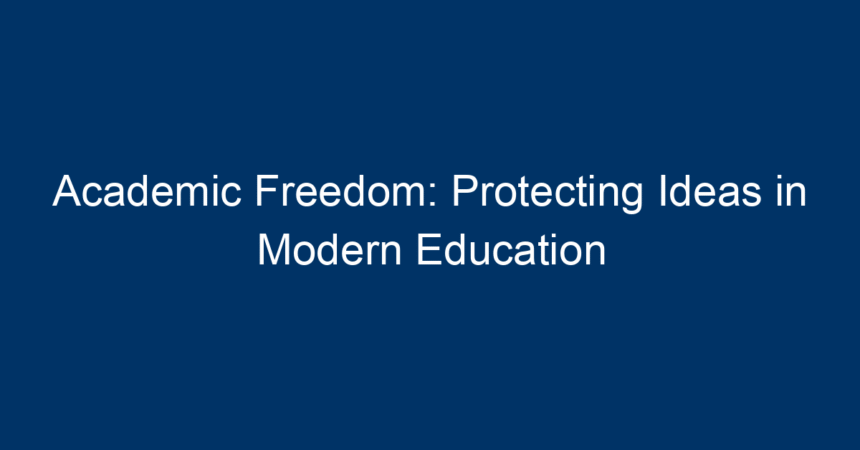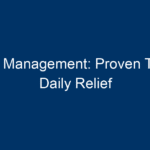Introduction
In an increasingly interconnected and fast-paced world, the role of education transcends simple knowledge acquisition; it involves nurturing critical thinking, creativity, and the ability to challenge the status quo. Central to this mission is the concept of academic freedom. As educators, students, and institutions grapple with political, social, and technological changes, protecting the rights to pursue and disseminate ideas becomes indispensable. This article explores the significance of academic freedom, the various challenges it faces, and actionable steps to safeguard this essential component of modern education.
What is Academic Freedom?
Academic freedom refers to the liberty of scholars, researchers, and students to engage in inquiry, debate, and exploration of ideas without fear of censorship or retaliation. This essential principle upholds the right to pursue new knowledge and express controversial opinions in educational settings.
The Importance of Academic Freedom
Academic freedom is crucial for several reasons:
- Fostering Innovation: When scholars feel free to explore unconventional ideas, it can lead to groundbreaking discoveries that may significantly benefit society.
- Encouraging Critical Thinking: Academic freedom cultivates an environment where questioning and skepticism are encouraged, leading to a more informed and engaged populace.
- Promoting Diverse Perspectives: A variety of viewpoints enriches academic discourse, helping students appreciate complexity and develop empathy.
The Historical Context
Understanding academic freedom requires a look at its evolution. This idea has roots in the Middle Ages, notably with institutions like the University of Bologna and the University of Paris, where scholars sought the autonomy to explore ideas freely. Over the centuries, moral and philosophical debates surrounding academic freedom intensified, especially during periods of political upheaval.
Key Milestones
- The American Association of University Professors (AAUP) was founded in 1915, focusing on protecting faculty rights and academic freedom.
- The Declaration on Academic Freedom at the UNESCO is another critical milestone, emphasizing the need for free expression as a human right.
Challenges to Academic Freedom
While the significance of academic freedom is widely acknowledged, it faces various challenges in the modern educational landscape.
Political Pressures
Political interference can threaten academic freedom. Governments may impose restrictions on what can be taught or researched, particularly concerning sensitive topics. This interference stifles debate and discourages scholars from exploring important issues.
Economic Constraints
Many educational institutions are subject to financial pressures that can influence academic freedom. When funding depends on donors or government grants, there may be an inherent bias that affects curriculum choices and research agendas. Scholars may feel compelled to tailor their work to align with the interests of their benefactors, thereby limiting their intellectual freedom.
Social Media and Public Scrutiny
In the digital age, social media has played a dual role. While it offers a platform for the dissemination of ideas, it also subjects academics to heightened scrutiny. Online backlash or cancel culture can discourage scholars from expressing opinions or pursuing controversial subjects. Consequently, this may lead to self-censorship.
The Role of Educational Institutions
Educational institutions are the bedrock of academic freedom, and they must actively foster an environment that protects this essential principle.
Crafting Clear Policies
Institutions should develop clear, robust policies surrounding academic freedom. These policies should outline the rights and responsibilities of faculty and students, ensuring that everyone understands their freedoms and limitations.
Providing Safe Spaces for Dialogue
Encouraging open discussions in classrooms and forums allows students and educators to debate various viewpoints. Creating safe spaces for dialogue can cultivate an environment of mutual respect, where freedom of expression is valued.
Support Structures
Institutions can also establish support structures that protect faculty and students against retaliation for expressing dissenting opinions. This might include anonymous reporting mechanisms and clear channels for addressing grievances related to academic freedom violations.
Faculty Responsibilities
While institutions have a significant role in upholding academic freedom, educators also bear responsibility.
Encouraging Inquiry
Faculty members should encourage students to ask questions and explore ideas, no matter how controversial they may be. This practice pushes everyone to think critically and engage meaningfully with the subject matter.
Modeling Integrity
Educators must model academic integrity by being transparent about their research and biases. This openness fosters trust and allows students to understand the complexities involved in academic inquiry.
Advocating for Change
Academics should advocate for policies that protect academic freedom, both within their institutions and in broader societal contexts. This may involve participating in discussions with administrators or joining professional organizations that champion this cause.
Students’ Role in Upholding Academic Freedom
Students are not just passive recipients of education; they have an essential role to play in safeguarding academic freedom.
Engaging in Discussions
Students can actively partake in discussions, voicing their opinions while respecting opposing perspectives. This engagement enriches the academic environment and encourages diverse viewpoints.
Supporting Peers
Solidarity among students is crucial. Supporting peers who may face challenges related to academic freedom shows a commitment to fostering an inclusive climate. It can also empower others to speak up.
Utilizing Resources
Students should be aware of the resources available for them to report violations of academic freedom. Familiarizing themselves with institutional policies and procedures will equip them to act if they encounter a loss of freedom.
The Future of Academic Freedom
Looking ahead, the future of academic freedom will depend on the collective efforts of all stakeholders in education. As pressures mount from various fronts, proactive measures must be taken to ensure that academic freedom remains a cornerstone of higher education.
Leveraging Technology
In the era of digital communication, technology can serve as a powerful tool for advocating academic freedom. Online platforms can facilitate discussions and information sharing, allowing marginalized voices to be heard.
Global Collaboration
Academic freedom is not just a local issue; it is a global one. International collaborations can provide a platform for scholars from various countries to share experiences, struggles, and strategies for protecting their rights.
Staying Vigilant
Both the educators and students must remain vigilant. This involves continuously monitoring and assessing the academic climate within their institutions and advocating for change where necessary.
Conclusion
Academic freedom is not merely a privilege; it is a necessity for the advancement of knowledge and the betterment of society. Protecting ideas in modern education requires a multi-faceted approach involving institutions, educators, and students. By actively engaging in discussions, advocating for policies, and fostering a culture of open inquiry, we can ensure that academic freedom remains intact for future generations.
Actionable Insights
- Educators: Create inclusive classrooms that encourage debate and uphold academic integrity.
- Institutions: Develop clear policies that protect academic freedom and offer support mechanisms for those facing backlash.
- Students: Engage in constructive discussions and remain informed about their rights regarding academic freedom.
By collectively acknowledging and embracing our roles, we can ensure a vibrant academic landscape that thrives on the free exchange of ideas.




